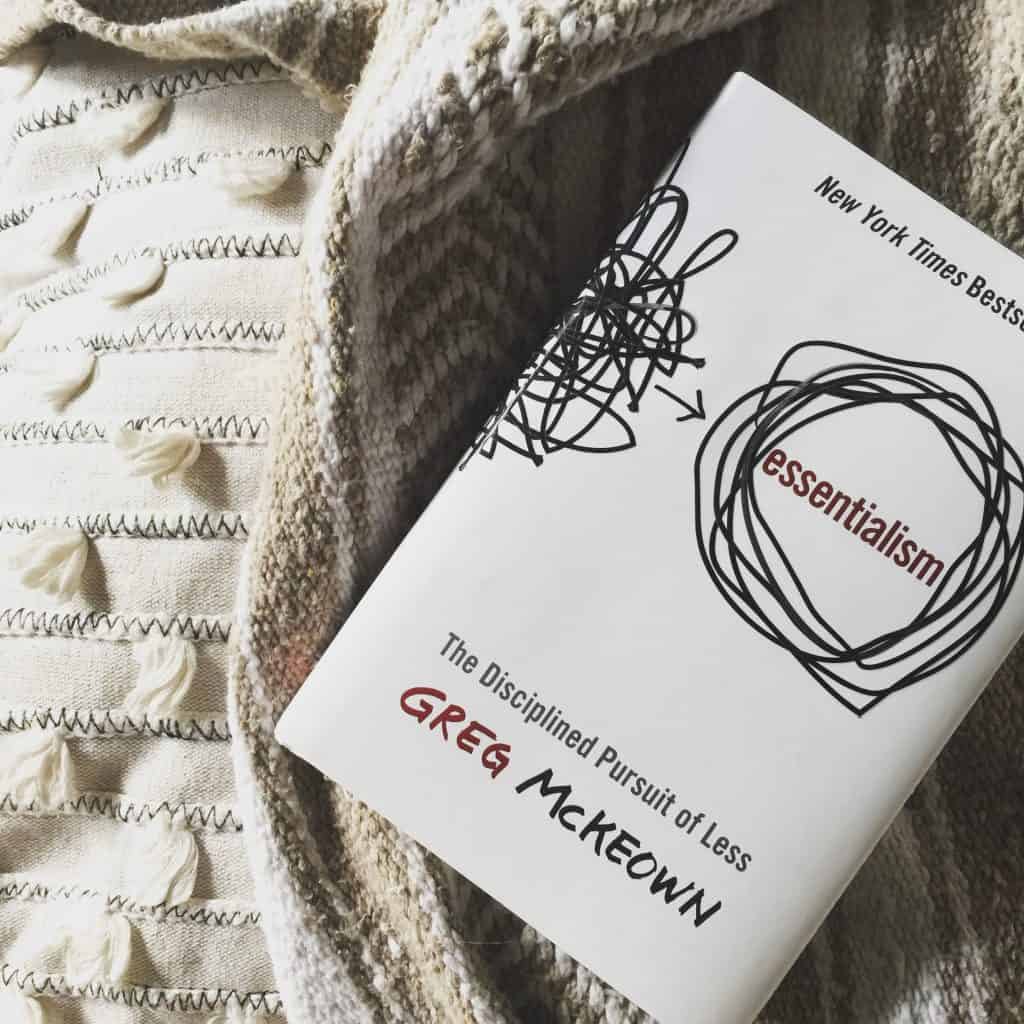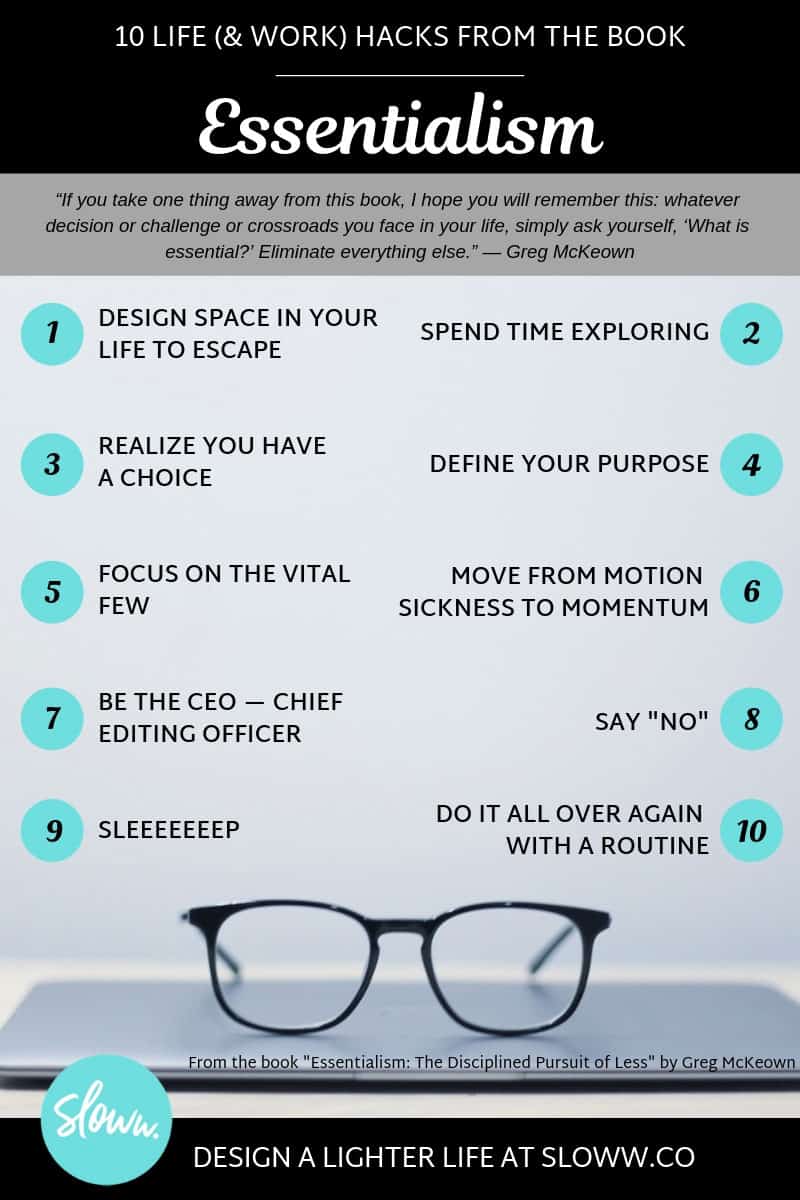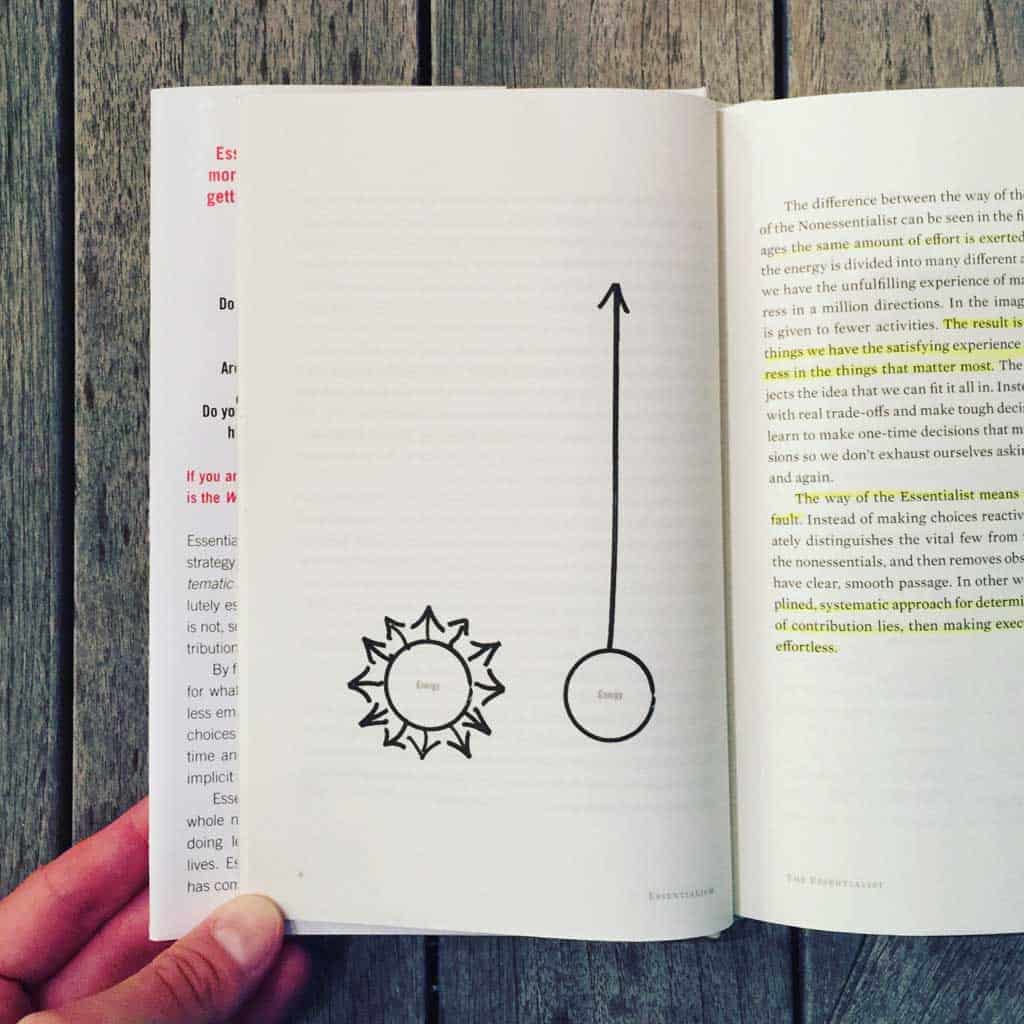
Essentialism by Greg McKeown — The Essentials:
Let’s kick things off with the Essentialism: The Disciplined Pursuit of Less (Amazon) elevator pitch. If you only have one minute to read this, here you go:
- Definition: Author Greg McKeown says the most fitting definition of essentialism is “less but better.”
- Basic Value Proposition: “Only once you give yourself the permission to stop trying to do it all, to stop saying yes to everyone, can you make your highest contribution towards the things that really matter.”
- One Takeaway: “If you take one thing away from this book, I hope you will remember this: whatever decision or challenge or crossroads you face in your life, simply ask yourself, ‘What is essential?’ Eliminate everything else.”
What essentialism is (and what it isn’t)
All quotes are from author Greg McKeown unless noted otherwise. I’ve added emphasis in bold.
- “This book is not about going back to some simpler time. It’s not about eschewing email or disconnecting from the Web or living like a hermit. That would be backwards movement. It is about applying the principles of ‘less but better’ to how we live our lives now and in the future. That is innovation.”
- “Essentialism is not about how to get more things done; it’s about how to get the right things done.”
- “Essentialism is not one more thing — it’s a whole new way of doing everything.”
- “The way of the Essentialist means living by design, not by default.”
Here’s a nice video introduction to Greg from Matt D’Avella’s podcast:
If you’re still here then you’re in for the long haul. Here are my top 10 life (and work) hacks from Essentialism: The Disciplined Pursuit of Less.
10 Life (& Work) Hacks from Essentialism

Essentialism #1: Design space in your life to escape
“Without great solitude no serious work is possible.” — Pablo Picasso
- “We need space to escape in order to discern the essential few from the trivial many. Unfortunately, In our time-starved era we don’t get that space by default—only by design.”
- “By being selective he bought himself space, and in that space he found creative freedom.”
- “For some reason there is a false association with the word focus. As with choice, people tend to think of focus as a thing. Yes, focus is something we have. But focus is also something we do…In order to have focus we need to escape to focus.”
- “He knew that making his highest point of contribution on a task required that he create the space for unencumbered thought.”
- “Bill Gates, who regularly (and famously) takes a regular week off from his daily duties at Microsoft simply to think and read.” (Note: Check out what some other people do when it comes to digital minimalism and digital decluttering)
Essentialism #2: Spend time exploring
“When I examine myself and my methods of thought, I come to the conclusion that the gift of fantasy has meant more to me than my talent for absorbing positive knowledge.” — Albert Einstein
- “If you believe being overly busy and overextended is evidence of productivity, then you probably believe that creating space to explore, think, and reflect should be kept to a minimum. Yet these very activities are the antidote to the nonessential busyness that infects so many of us.”
- “Essentialists spend as much time as possible exploring, listening, debating, questioning, and thinking. But their exploration is not an end in itself. The purpose of the exploration is to discern the vital few from the trivial many.”
- “This is why an Essentialist takes the time to explore all his options. The extra investment is justified because some things are so much more important that they repay the effort invested in finding those things tenfold. An Essentialist, in other words, discerns more so he can do less.”
- “Play leads to brain plasticity, adaptability, and creativity. Nothing fires up the brain like play.” (Stuart Brown, founder of the National Institute for Play)
- “There are two ways to think about Essentialism. The first is to think of it as something you do occasionally. The second is to think of it as something you are. In the latter, it is a different way—a simpler way—of doing everything. It becomes a lifestyle.”
Essentialism #3: Realize you have a choice
“In a few hundred years, when the history of our time will be written from a long-term perspective, it is likely that the most important event historians will see is not technology, not the Internet, not e-commerce. It is an unprecedented change in the human condition. For the first time—literally—substantial and rapidly growing numbers of people have choices. For the first time, they will have to manage themselves. And society is totally unprepared for it.” — Peter Drucker
- “We have lost our ability to filter what is important and what isn’t. Psychologists call this ‘decision fatigue’: the more choices we are forced to make, the more the quality of our decisions deteriorates.”
- “Our options may be things, but a choice—a choice is an action.”
- “Focusing on the essentials is a choice. It is your choice. That in itself is incredibly liberating.”
- “To become an Essentialist requires a heightened awareness of our ability to choose.”
Essentialism #4: Define your purpose
“The crime which bankrupts men and states is that of job-work;—declining from your main design to serve a turn here or there.” — Ralph Waldo Emerson
- “Jim Collins’s Good to Great, in which he contends if there’s one thing you are passionate about—and that you can be best at—you should do just that one thing.”
- “Inspirational + Concrete = Essential Intent (makes one decision that eliminates 1,000 later decisions)”
- “Creating an essential intent is hard. It takes courage, insight, and foresight to see which activities and efforts will add up to your single highest point of contribution. It takes asking tough questions, making real trade-offs, and exercising serious discipline to cut out the competing priorities that distract us from our true intention. Yet it is worth the effort because only with real clarity of purpose can people, teams, and organizations fully mobilize and achieve something truly excellent.”
- “Mohandas K. Gandhi — Suddenly, he found a higher purpose: the liberation of the oppressed everywhere. With his new singleness of purpose, he eliminated everything else from his life. He called the process ‘reducing himself to zero.'”
Essentialism #5: Focus on the vital few
“You cannot overestimate the unimportance of practically everything.” — John Maxwell
- “The main thing is to keep the main thing the main thing.” (Stephen R. Covey)
- “The word priority came into the English language in the 1400s. It was singular. It meant the very first or prior thing. It stayed singular for the next five hundred years. Only in the 1900s did we pluralize the term and start talking about priorities.”
- “The iconoclastic entrepreneur and venture capitalist Peter Thiel took ‘less but better’ to an unorthodox level when he insisted that PayPal employees select one single priority in their role — and focus on that exclusively. As PayPal executive Keith Rabois recalls: ‘Peter required that everyone be tasked with exactly one priority. He would refuse to discuss virtually anything else with you except what was currently assigned as your #1 initiative. Even our annual review forms in 2001 required each employee to identify their single most valuable contribution to the company.'”
- “I do believe in simplicity. It is astonishing as well as sad, how many trivial affairs even the wisest thinks he must attend to in a day;…so simplify the problem of life, distinguish the necessary and the real.” (Henry David Thoreau)

Essentialism #6: Move from motion sickness to momentum
“To follow, without halt, one aim: There is the secret to success.” — Anna Pavlova
- “Moved from a state of motion sickness to momentum…Instead of making just a millimeter of progress in a million directions he began to generate tremendous momentum towards accomplishing the things that were truly vital.”
- “The result is that by investing in fewer things we have the satisfying experience of making significant progress in the things that matter most.”
- “Dieter Rams was the lead designer at Braun for many years. He is driven by the idea that almost everything is noise. He believes very few things are essential. His job is to filter through that noise until he gets to the essence.”
- “Essentialism is a systematic discipline for discerning what is absolutely essential, then eliminating everything that is not.”
Essentialism #7: Be the CEO — Chief Editing Officer
“There are no solutions. There are only trade-offs.” — Thomas Sowell
- “Ignoring the reality of trade-offs is a terrible strategy for organizations. It turns out to be a terrible strategy for people as well.”
- “Essentialists see trade-offs as an inherent part of life, not as an inherently negative part of life. Instead of asking, ‘What do I have to give up?’ they ask, ‘What do I want to go big on?’ The cumulative impact of this small change in thinking can be profound.”
- “Jack Dorsey…he said he thinks of the role of CEO as being the chief editor of the company. ‘As an editor I am constantly taking these inputs and deciding the one, or intersection of a few, that make sense for what we are doing.'”
- “Becoming an Essentialist means making cutting, condensing, and correcting a natural part of our daily routine—making editing a natural cadence in our lives.”
- “To attain knowledge add things every day. To attain wisdom subtract things every day.” (Lao-tzu)
Essentialism #8: Say “NO”
“Half of the troubles of this life can be traced to saying yes too quickly and not saying no soon enough.” — Josh Billings
- “We need to learn the slow ‘yes’ and the quick ‘no.'” (Tom Friel)
- “This doesn’t mean you have to be cynical about people. I don’t mean to imply people shouldn’t be trusted. I am simply saying everyone is selling something—an idea, a viewpoint, an opinion—in exchange for your time. Simply being aware of what is being sold allows us to be more deliberate in deciding whether we want to buy it.”
- “Entrepreneurs succeed when they say ‘yes’ to the right project, at the right time, in the right way. To accomplish this, they have to be good at saying ‘no’ to all their other ideas.” (Reid Hoffman)
- “It was like he was majoring in minor activities.”
- “Anytime you fail to say ‘no’ to a nonessential, you are really saying yes by default.”
- Read this story about Peter Drucker for one of my favorite examples of saying no.
Essentialism #9: Sleeeeeeep
- “The second most important factor differentiating the best violinists from the good violinists was actually sleep. The best violinists slept an average of 8.6 hours in every twenty-four-hour period: about an hour longer than the average American. Over the period of a week they also spent an average of 2.8 hours of napping in the afternoon: about two hours longer than the average.” (Note: Think about this when designing your 24 hours per day)
- “Some good news for the early birds and night owls among us: science shows that even a nap can increase creativity.”
- “Even a brief period of deep sleep, in other words, helps us make the kinds of new connections that allow us to better explore our world. In a nutshell, sleep is what allows us to operate at our highest level of contribution so that we can achieve more, in less time.”
Essentialism #10: Do it all over again (and again and again) with a routine
“Every day do something that will inch you closer to a better tomorrow.” — Doug Firebaugh
- “‘Everyday progress — even a small win’ can make all the difference in how people feel and perform. ‘Of all the things that can boost emotions, motivation, and perceptions during a workday, the single most important is making progress in meaningful work.'” (Amiable and Kramer)
- “The Essentialist designs a routine that makes achieving what you have identified as essential the default position. Yes, in some instances an Essentialist still has to work hard, but with the right routine in place each effort yields exponentially greater results.”
- “There is a huge body of scientific research to explain the mechanism by which routine enables difficult things to become easy.”
- “The right routines can actually enhance innovation and creativity by giving us the equivalent of an energy rebate.”
- “The work Mihaly Csikszentmihalyi has done on creativity demonstrates how highly creative people use strict routines to free up their minds. ‘Most creative individuals find out early what their best rhythms are for sleeping, eating, and working, and abide by them even when it is tempting to do otherwise. They wear clothes that are comfortable, they interact only with people they find congenial, they do only things they think are important. Of course, such idiosyncrasies are not endearing to those they have to deal with…But personalizing patterns of action helps to free the mind from the expectations that make demands on attention and allows intense concentration on matters that count.'”
Bonus: Here’s a talk author Greg McKeown gave at Google
Questions to Ask Yourself:
Wrapping things up, here are some of the questions the author asks us to think about. Have some thoughts? Please share in the comments. And, you can check out all my book summaries here.
- “Ask three questions: ‘What do I feel deeply passionate about/inspired by?’ and ‘What am I particularly talented at?’ and ‘What meets a significant need in the world?’ (Note: Add one more question (What can I be paid to do?) and you have the four questions of ikigai to find life purpose)
- “If you could do only one thing with your life right now, what would you do?”
- “Is this the very most important thing I should be doing with my time and resources right now?”
- My Personal Favorite: “What’s important now? After a moment of reflection I realized that until I knew what was important right now, what was important right now was to figure out what was important right now!”
Read Next:
- If you liked Essentialism, you may also enjoy my book summary of Atomic Habits by James Clear
- There’s also a Premium Member companion post to help you take action: How to Pick a Path & Make Progress by Combining “Essentialism” & “Atomic Habits” (+ Infographic)
Slow Living Resources:
Slow Living 101 | Slow Living Life Hacks | Slow Living Challenges | Slow Living Quotes | Slow Living Videos
You can follow Sloww via email using the form field below this post or on social media: Twitter | Facebook | Instagram | Pinterest





